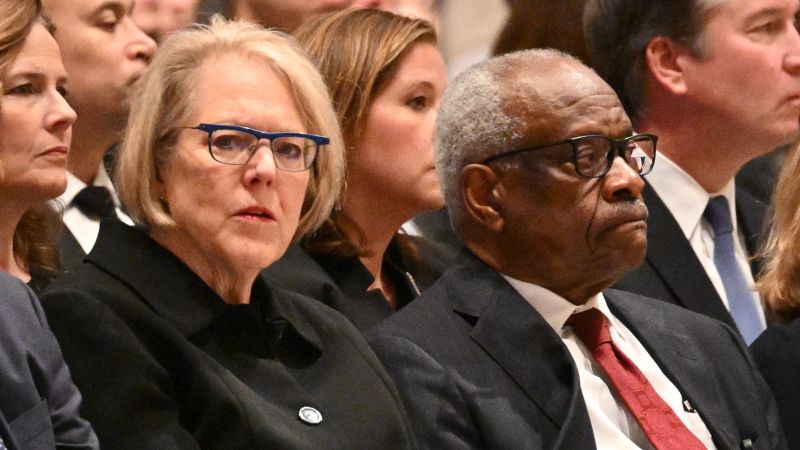Amidst calls for Justice Clarence Thomas to recuse himself from a case involving Donald Trump’s presidential immunity from criminal prosecution, he has made it clear that he does not plan to step aside or respond publicly to the calls from Democrats and others. Critics are pointing to actions by Thomas’ wife, Virginia “Ginni” Thomas, related to trying to reverse the 2020 election and her attendance at a rally held by Trump on January 6, 2021, before the US Capitol attack. Despite the pressure, Thomas has not indicated any intention to recuse himself from the case, which the Supreme Court will hear arguments in on Thursday. Experts suggest that he should need to explain his decision not to recuse to maintain impartiality.
The Supreme Court justices have autonomy in making recusal decisions based on a code of conduct and federal laws governing judicial conduct. The code dictates that a justice should recuse themselves if their impartiality could reasonably be questioned by an unbiased and reasonable person aware of the circumstances. However, the final decision on recusal is left to the justice themselves, with no formal way for other members of the court to influence their choice. The court has not responded to requests for comments on Thomas’ decision not to recuse himself from the case involving Trump’s presidential immunity from prosecution.
Calls for Thomas to recuse himself continue due to his wife’s efforts related to the 2020 election and her participation in the rally before the Capitol attack. Despite these calls, Thomas has faced similar situations in the past and has not recused himself, leading to concerns about the impartiality of the justice. Critics argue that Thomas’ refusal to recuse erodes public trust in the Supreme Court and democracy as a whole. Ginni Thomas has stated that she played no role in the events of January 6 and does not involve her husband in her political activities, but critics have pointed to her communication with then-White House Chief of Staff Mark Meadows about Trump’s efforts to overturn the election results.
The potential consequences of Thomas recusing himself from the case are highlighted by the fact that a replacement justice cannot be brought in at the Supreme Court level, unlike in lower courts. Trump is requesting presidential immunity from prosecution in the federal election subversion case brought against him, with lower courts ruling against him. If Thomas were to recuse himself and the court tied 4-4, the prosecution could proceed. Recusals at the Supreme Court are not uncommon, as evidenced by Justice Samuel Alito’s refusal to step aside from a tax case despite calls for him to recuse. Other justices have also recused themselves from cases due to various conflicts of interest, showing that the issue is not unique to Justice Thomas.


